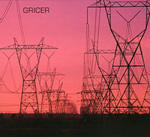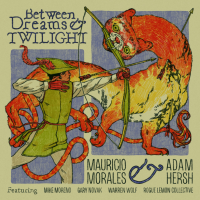Home » Jazz Articles » Year in Review » 2005: The Year in Jazz
2005: The Year in Jazz
When nasty Hurricane Katrina bore down on the U.S. Gulf Coast in late August, its floodwaters broke through New Orleans' fragile levees, and the storm and its aftermath laid waste to a city built below sea level—and best known to many of us as the cradle of jazz.
It also brought out the best in us. Not knowing how long it will take the region to recover, or if it truly will, people across the U.S. and around the world responded with generosity and creativity to begin the process. The music industry, including affected musicians, has been at the forefront of those efforts.
Dozens of concerts, many featuring New Orleans musicians, were held all over the U.S. to raise funds for Katrina relief efforts, some specifically channeled to help Crescent City musicians. Some concerts, including the five-hour Higher Ground benefit at Lincoln Center, resulted in fundraising recordings. Several labels, including Nonesuch, Rounder/Marsalis Music Rykodisc and the Recording Industry Association of America, released relief benefit albums. Dr. John quickly and recorded his own Katrina relief fundraising CD, appropriately titled Sippiana Herricane.
The New York-based, and largely Big Apple-focused, Jazz Musicians Emergency Fund, expanded its efforts. In the first nine weeks after the emergency, Executive Director Wendy Oxenhorn reports the non-profit agency handled 508 Katrina-related emergency cases that involved clothing and feeding families, repairing cars and musical instruments, helping find new homes, pay mortgages and provide counseling. It also donated more than $200,000 in donated new instruments to New Orleans musicians that it received from instrument companies—and employed more than 150 New Orleans jazz and blues musicians in schools and senior centers in seven states where they have resettled, at least temporarily.
"With so many New Orleans musicians still coming in for help, Oxenhorn said, "the challenge now, is to be able to keep up all we are doing for them and our regular 35-a-week, nationwide elderly jazz and blues pioneers who still suffer from sickness, lack of employment, eviction, and homelessness.
One creative initiative, led by Ellis and Branford Marsalis and Harry Connick Jr., is designed to resolve one Katrina-related dilemma: the storm forced many musicians to flee New Orleans but those who seek to return, like so much of the population, have nowhere to go.
Habitat for Humanity, working with Connick and Branford Marsalis, announced plans in early December to create a "Musicians' Village" in the Crescent City. It will consist of Habitat-constructed homes for displaced New Orleans musicians. Its centerpiece will be the Ellis Marsalis Center for Music, dedicated to the education and development for homeowners and others who will live nearby. The center, named for the Marsalis family patriarch, will include performance rooms and classrooms.
"This plan, this village, will help restore New Orleans' musical heritage, and protect it for the next generation that will follow," Branford Marsalis said. "It's also the beginning of Habitat's return to work in the city, which will see hundreds of houses built in the years to come, to help hurricane recovery and beyond."
Seed money for the Musicians' Village is coming from proceeds from the historic From the Big Apple To The Big Easy benefit concerts, held at both Madison Square Garden and Radio City Music Hall on Sept. 20, which have been directed towards this effort as part of the event's overall commitment to support the long-term rebuilding efforts of the Gulf Coast region.
"This is very exciting because it uses the Habitat model—building homes and communities—and takes it a step farther, to helping hope for the future," said Connick. "Children will grow up in the neighborhoods, in a safe and secure environment, and at the same time the opportunity to become a part of the musical and cultural scene in New Orleans."
There were other developments of note in the jazz world during the year:
So Much For Independence: Only a few years after its battling its own financial woes, the Concord Music Group acquired Cleveland-based Telarc International, a classical music, jazz contemporary instrumental and world music recordings through its Telarc, Telarc Jazz and Heads Up recordings. The transaction follows Concord's late 2004 purchase of Fantasy Records, which is home to such historic imprints as Milestone, Pablo, Prestige/New Jazz, Riverside/Jazzland Stax/Volt/Enterprise, Specialty, Takoma, and many more. Concord executives say the transaction further bolsters the Concord Music Group as one of the world's largest and most dynamic independent record companies. It also begs the question: With more than 15 labels within its growing family, when does one stop being considered an "independent record company?
Two Steps Forward, One Step Back: To understand the fragility of the jazz scene, in most every city, one need look no further than the Big Apple. Jazz at Lincoln Center's new home with a large performance space and a more intimate club setting, seems to be taking on a strong, creative life of its own. Then there's the case of Au Bar Jazz, which opened in early 2004 and fast became a favored Manhattan venue for singers including Dee Dee Bridgewater, Dr. John, Madeleine Peyroux and Shirley Horn. By June of this year, the performance programming had been suspended, leaving entertainers and fans in the lurch.
Brecker's Battle: The jazz world also rallied around Michael Brecker in his battle against the rare bone marrow disorder Myelodyplastic syndrome(MDS). A worldwide search for a donor for a stem stell and bone marrow transplant included testing of attendees at two jazz festivals (Newport and Red Sea). Since no match had been found, Brecker in November underwent a transplant with donations from his daughter. Brother Randy Brecker reported that Michael remained optimistic. He was uunable to perform in two planned summer tours with Steps Ahead and the Saxophone Summit with Dave Liebman and Joe Lovano.
Take the "A" Train: The Jazz Museum in Harlem has appointed bassist Christian McBride as its co-director. Working work with Loren Schoenberg, the Museum's executive director, McBride will bring his extensive experience as a premier educator, producer and internationally acclaimed bandleader and bassist to the museum's projects and programs.
Peace Mission Concerts: Carlos Santana, Herbie Hancock and Wayne Shorter united for Emissaries for Peace concerts in Nagasaki and Hiroshima this summer to commemorate the 60th anniversary of the atomic bombing of the two Japanese cities during World War II. They also visited Hiroshima's Peace Memorial Park together.
Awards Galore Since 2004
Masterful Jazz Again: Kenny Burrell, Paquito D'Rivera, Slide Hampton, Shirley Horn, Artie Shaw, Jimmy Smith and George Wein were honored as American Jazz Masters by the National Endowment for the Arts on January 7, 2005. The presentations took place in Long Beach, California, at the annual IAJE conference. It was the second class of inductees since the NEA expanded its presentation to include six musicians per year and one other honoree for other contributions to the jazz. The third class, to be honored January 13, 2006 in New York, includes Ray Barretto, Tony Bennett, Bob Brookmeyer, Chick Corea, Buddy DeFranco, Freddy Hubbard and John Levy.
Ertegun Hall of Fame: Jazz at Lincoln Center named Count Basie, Roy Eldridge, Ella Fitzgerald, Benny Goodman, Earl "Fatha Hines, Johnny Hodges, Jo Jones, Charles Mingus, King Oliver, Max Roach, Sonny Rollins and Fats Waller as the 2005 inductees into its Nesuhi Ertegun Jazz Hall of Fame.
Monk Goes Guitar: This year's Thelonious Monk International Jazz Competition turned its sights on guitar. Norwegian Lage Lund emerged the $20,000 first place winner from the 10 semi-finalists who gathered in Washington, D.C., in September. Second and third place went to Miles Okazaki and David Mooney respectively.
JJA Jazz Award Winners: Composer/bandleader Maria Schneider dominated the Jazz Journalists Association's ninth annual Jazz Awards in mid-June, collecting honors for album, composer, arranger and large ensemble of the year. Pianist Hank Jones received the JJA's Lifetime Achievement Award and bassist/bandleader Dave Holland was named Musician of the Year.
Essentially Ellington: Miami's New World School of the Arts High School Jazz Ensemble won Jazz at Lincoln Center's 10th annual Essentially Ellington High School Jazz Band Competition & Festival in May. Second place went to Seattle's Roosevelt High School Jazz Band. The Mountlake Terrace, Wash., High School Jazz Ensemble I was third among the 15 finalist bands.
More for Les: Rock and Roll Hall of Fame inductee Les Paul is now also a member of the National Inventors Hall of Fame for his creation of the solid-body electric guitar, which he first built in 1941 and refined throughout the decade. He still does this jazz thing Monday nights at Iridium.
And the Grammy Goes To...: The 47th annual GRAMMY Award Winners this past February included Bill Frisell's Unspeakable (Nonesuch Records) as Best Contemporary Jazz Album; Nancy Wilson's R.S.V.P. (MCG Jazz) as Best Jazz Vocal Album; Herbie Hancock, Best Jazz Instrumental Solo, for his performance on the track "Speak Like A Child on drummer Harvey Mason's With All My Heart (Bluebird); McCoy Tyner's Illuminations (Telarc) as Best Jazz Instrumental Album, Individual or Group; and Maria Schneider's Concert in the Garden (ArtistShare) as Best Large Jazz Ensemble Album.
Charlie Haden's Land of the Sun (Verve) was Best Latin Jazz Album; Slide Hampton was honored for Best Instrumental Arrangement for "Past Present & Future,' a track from The Vanguard Jazz Orchestra's CD The Way—Music Of Slide Hampton (Planet Arts Recordings). Loren Schoenberg received the Grammy for Best Album Notes for his writing on The Complete Columbia Recordings Of Woody Herman And His Orchestra & Woodchoppers (1945-1947) (Mosaic Records).
Montreal Honors: The Festival International de Jazz de Montréal included several major awards during its 2005 edition to artists who've made extraordinary contributions to the evolution of jazz. Singer Khaled was honored with the Antonio Carlos-Jobim Award for contributions to world music; singer Al Jarreau received the Ella Fitzgerald Award, bassist Dave Holland was honored with Miles Davis Award; and Quebec drummer and band leader Bernard Primeau won the Oscar Peterson Award for lifetime achievement by a Canadian musician.
Stamp of Approval: Pianist Oscar Peterson was honored August 15 (his 80th birthday) with a precedent-setting Canadian postage stamp. Canada Post Corp. issued the 50-cent Peterson stamp in recognition of the Montreal native's life work as a pianist and as a composer. The stamp is the first in Canada to celebrate a living individual. Fellow Canadian Diana Krall serenaded Peterson with a Peterson instrumental with lyrics written for the occasion by her husband, Elvis Costello. After cutting a keyboard-shaped birthday cake, Peterson played his composition "Requiem in tribute to the many jazz artists who have died in recent years.
DB Hall of Fame: Pianist Herbie Hancock (readers) and soprano saxophonist Steve Lacy (critics) were named to the DownBeat magazine Hall of Fame in 2005.
Final Bars 2005
The list of jazz and jazz-related musicians, singers and industry figures who have passed on to the celestial jazz big band keeps on growing, year-by-year. This year's heavyweight losses included Jimmy Smith, Percy Heath, Lucky Thompson, Oscar Brown Jr., Shirley Horn, Bobby Short, Juan Pablo Torres and Benny Bailey.
Here's a rundown of those 2005 (and late 2004) passings, alphabetical by instrument or specialty:
- Arranger Lyle "Spud Murphy
- Arranger, conductor, bandleader and recording executive Salvatore "Tutti Camarata
- Arranger, bandleader and multi-instrumentalist Charlie Hampton
- Arranger and bassist Mandy Vizoso
- Avant-garde musician and electronic instruments inventor Hugh Davies
- B-3 organist Jimmy Smith
- Bandleaders Skitch Henderson and Oleg Lundstrom
- Bassists Keter Betts, Percy Heath, Jack Lesberg, Al McKibbon, Pierre Michelot, Niels-Henning Ørsted Pedersen, Wayne Pedzwater, Bob Stata, Warren Vaché Sr. and Jimmy Woode
- Clarinetist Wally Garner
- Composer, arranger and pianists Francy Bolland, Joe Harnell, Tom Talbert and Earl Zindars
- Drummers Roy Brooks, Lulu Gontsana, Skip Howlett, Stan Levey, Raul Paonessa and Don Um Romao
- Drummer, percussionist and vibes player Larry Bunker
- Guitarists Billy Bauer, Al Casey, Hank Garland (late 2004), Ted Greene, Dudley Hill and Paul Nash
- Multi-instrumentalist, composer and inventor Emanuel (Manny) Logan Jr.
- Percussionists Toño Pepin and Pancho Quinto
- Pianists Victor Boa (late 2004), Francy Boland, Martin Denny, Teddy Harris Jr., Ed Kelly, Enos Payne, Bill Potts and Per Henrik Wallin
- Saxophonists Arnie Lawrence, Steve Marcus, Dale Norris, Billy Robinson, John Stubblefield and Lucky Thompson
- Singers Pam Bricker, Clarence "Gatemouth Brown, Oscar Brown Jr., Ibrahim Ferrer, Milt Gryson, Shirley Horn, Frances Langford, José Antonio Rodriguez, Lazaro Ros, Bobby Short and Monica Zetterlund
- Trombonists Bob Enevoldsen, Albert Mangelsdorff, Charles "Big Poppa Stephens and Juan Pablo Torres
- Trumpeters Benny Bailey, Chris Griffin and William Vacchiano
- Jazz and folk festival executive Joyce Wein
- Jazz historian Walter Schaap
- Jazz photographer Pail Hoeffler
- Radio broadcaster, jazz record producer, journalist Mort Fega
Tags
PREVIOUS / NEXT
Support All About Jazz
 All About Jazz has been a pillar of jazz since 1995, championing it as an art form and, more importantly, supporting the musicians who make it. Our enduring commitment has made "AAJ" one of the most culturally important websites of its kind, read by hundreds of thousands of fans, musicians and industry figures every month.
All About Jazz has been a pillar of jazz since 1995, championing it as an art form and, more importantly, supporting the musicians who make it. Our enduring commitment has made "AAJ" one of the most culturally important websites of its kind, read by hundreds of thousands of fans, musicians and industry figures every month.





















